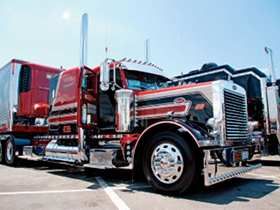Scared Of Becoming A Truck Driver. Please Help Me!
Topic 11718 | Page 3

That equates to approximately 653 miles per day each day for 6 days. Therefore you must essentially average 65 mph.
He's probably not going to be governed at a God-awful 65mph. So it sounds easy as pie to me.
One factor it looks like you all forgot: the 70 hours in 8 day limit.
If you are realistically hitting 11 hours ever day, you must stop on day 7 after four hours. (Math time: 6 * 11 = 66, + 4 = 70). Then you get a day off!

I called today to verify the miles and was told 2700-3900 miles per week. That is in 5-6 days which makes more sense to me now. It's about 450-490 miles one way so each round trip is 900-980 miles. They say I can legally do 4 round trips per week. I can see 3 round trips, but how can I possibly do 4 round trips? Thats closer to 4000 miles now. What do you guys think? I'm new to this so I'm not trying to kill myself out there. I think I can manage 3 round trips weekly, but 4 seems crazy.
A lot of it depends on the truck and the route. Is the truck governed? At what speed? Mine governed at 68 and it's hard to average 60+ every day. What the speed limit on the route ? Do you need to get into cities during rush hour? How flexible are the live load is it at a fix hour appointment or you get loaded as you arrived? Is there major road work on the route? Is the route affected by weather conditions?
my advice take a weekly calendar and fill up start driving time break average speed time for drop and hook Sometimes it takes more then you think waiting in line at gates security check line at shipping receiving office etc.
After you do it and get all info you will know better how many miles you can do per week.
And as others said don't compromise safety.
Good Luck.
Drop And Hook:
Drop and hook means the driver will drop one trailer and hook to another one.
In order to speed up the pickup and delivery process a driver may be instructed to drop their empty trailer and hook to one that is already loaded, or drop their loaded trailer and hook to one that is already empty. That way the driver will not have to wait for a trailer to be loaded or unloaded.

Wow!! Lots of great info. Thanks for all the support guys. I think I'll take it slow and run 3 round trips to start. I am a newbie.

I'm back everyone. I never pulled the trigger to go out and drive. Stayed with my current office job. I'll be ready after my wife has the baby in 2-4 weeks. I want to ask for help on where and how should I start?
I want to do things right and go out for training for a little bit 1-2 weeks.
I want a job where I'm back home each weekend.
I need to make minimum if 1200 per week.
I have a old felony from 2006.
Where do you think I should start?
Thanks guys

Newbie. Welcome back.
I might have some harrowing news for you. Well, 'harrowing' might be a bit dramatic. But still, probably not what you're looking to hear. I'm a bit surprised because based on your background in dispatch, and some other things you claim, you should have some kind of familiarity with what truck drivers earn and the relationship of income / miles / cpm. I'm surprised because you should know that in the truckload industry, the income you're looking for is not really available, in regard to income for a rookie driver running a dedicated route. And I'm assuming you're looking at the truckload sector.
I'm also assuming the $1,200 weekly income you need is net income, not gross. When most people throw out specific numbers, it's because they're working with a budget, and most folks think in terms of 'net,' in order to meet that budget without doing the extra math to deduct from a gross figure. So.....
You'll be hard-pressed to see $1,200 weekly net income as a rookie. You'd be hard-pressed to see that kind of money as a veteran driver in the industry, especially on a consistent basis. Not saying it can't be done, but you're looking at the type of income that top-tier, savvy drivers earn, or drivers in a specialized part of the trucking industry.
Simple math. 2500 miles X .50 cpm (which is very generous with the cpm, especially for a rookie) = $1,250 gross. Assuming 25% is taken away for taxes, and you have $937.50. That's without any other deductions like health insurance, 401k, or any kind of short/long term disability. This is also assuming you're able to churn out 2500 miles, week after week. That takes time management and experience, not to mention available freight.
If you're looking at the truckload sector, you probably will not find .50 cpm, especially as a rookie. A lot of experienced, company drivers don't make .50 cpm. Shaffer Trucking, a top-paying carrier, pays their experienced drivers .51 cpm. Realistically as a rookie you are probably looking at between .30-.40 cpm average. Prime will pay rookies more if you're in a lightweight truck. Shaffer is on the high end of the pay scale for rookies.
An average income for an experienced driver might be between 50-70k. Take the mean, which would be 60,000, and a weekly income after taxes (net income) is around $865.00. That's assuming 25% for taxes, and not including other deductions like health insurance.
Average income for an inexperienced driver? 30-40k. The mean of which is 35k. 35,000 x .75 (taxes) = 26,250.00 net annual income
26,250 / 52 (weeks in year) = 504.81 weekly
or ... divided by 12 months in a year, and then 4 weeks per month
26,250 / 12 = 2,187.50 per month
2,187.50 / 4 weeks = 546.875 weekly
Dedicated Route:
A driver or carrier who transports cargo between regular, prescribed routes. Normally it means a driver will be dedicated to working for one particular customer like Walmart or Home Depot and they will only haul freight for that customer. You'll often hear drivers say something like, "I'm on the Walmart dedicated account."
CPM:
Cents Per Mile
Drivers are often paid by the mile and it's given in cents per mile, or cpm.
OWI:
Operating While Intoxicated

Sidebar: I love how threads with topics that have no real relevance to me personally can be filled with excellent information quite relevant!!
View More
Newbie. Welcome back.
I might have some harrowing news for you. Well, 'harrowing' might be a bit dramatic. But still, probably not what you're looking to hear. I'm a bit surprised because based on your background in dispatch, and some other things you claim, you should have some kind of familiarity with what truck drivers earn and the relationship of income / miles / cpm. I'm surprised because you should know that in the truckload industry, the income you're looking for is not really available, in regard to income for a rookie driver running a dedicated route. And I'm assuming you're looking at the truckload sector.
I'm also assuming the $1,200 weekly income you need is net income, not gross. When most people throw out specific numbers, it's because they're working with a budget, and most folks think in terms of 'net,' in order to meet that budget without doing the extra math to deduct from a gross figure. So.....
You'll be hard-pressed to see $1,200 weekly net income as a rookie. You'd be hard-pressed to see that kind of money as a veteran driver in the industry, especially on a consistent basis. Not saying it can't be done, but you're looking at the type of income that top-tier, savvy drivers earn, or drivers in a specialized part of the trucking industry.
Simple math. 2500 miles X .50 cpm (which is very generous with the cpm, especially for a rookie) = $1,250 gross. Assuming 25% is taken away for taxes, and you have $937.50. That's without any other deductions like health insurance, 401k, or any kind of short/long term disability. This is also assuming you're able to churn out 2500 miles, week after week. That takes time management and experience, not to mention available freight.
If you're looking at the truckload sector, you probably will not find .50 cpm, especially as a rookie. A lot of experienced, company drivers don't make .50 cpm. Shaffer Trucking, a top-paying carrier, pays their experienced drivers .51 cpm. Realistically as a rookie you are probably looking at between .30-.40 cpm average. Prime will pay rookies more if you're in a lightweight truck. Shaffer is on the high end of the pay scale for rookies.
An average income for an experienced driver might be between 50-70k. Take the mean, which would be 60,000, and a weekly income after taxes (net income) is around $865.00. That's assuming 25% for taxes, and not including other deductions like health insurance.
Average income for an inexperienced driver? 30-40k. The mean of which is 35k. 35,000 x .75 (taxes) = 26,250.00 net annual income
26,250 / 52 (weeks in year) = 504.81 weekly
or ... divided by 12 months in a year, and then 4 weeks per month
26,250 / 12 = 2,187.50 per month
2,187.50 / 4 weeks = 546.875 weekly
Newbie solo guy, this is sound advice. Rookie otr or dedicated drivers in the truckload sector average $500-600 a week after taxes. You might make a really good paycheck every once in a while but it will probably be offset by a really lousy paycheck the next week. Another thing to consider is that you lose money every time you come home for a couple of days since you're not driving on those days.
Dedicated Route:
A driver or carrier who transports cargo between regular, prescribed routes. Normally it means a driver will be dedicated to working for one particular customer like Walmart or Home Depot and they will only haul freight for that customer. You'll often hear drivers say something like, "I'm on the Walmart dedicated account."
OTR:
Over The Road
OTR driving normally means you'll be hauling freight to various customers throughout your company's hauling region. It often entails being gone from home for two to three weeks at a time.
CPM:
Cents Per Mile
Drivers are often paid by the mile and it's given in cents per mile, or cpm.
HOS:
Hours Of Service
HOS refers to the logbook hours of service regulations.OWI:
Operating While Intoxicated

I am in the same boat. Not really Financially. But just little nervous about doing something all brand new to me. I been in factory all my life. I also been a bus driver all my life as well. So I do have experience with the Smith system and the g.o.a.l stradages.
New Reply:
New! Check out our help videos for a better understanding of our forum features

















Preview:
This topic has the following tags:
Advice For New Truck Drivers Becoming A Truck Driver Life On The Road Truck Driver Training Truck Driving Lifestyle









 TT On Facebook
TT On Facebook
Math time. On the low end spectrum you listed 900 miles per round trip.
900 x 4 round trips = 3600 miles.
On a average of 600 miles per day you could do 3600 miles if you worked 6 days per week. Keep in mind, maintaining the 600 mile per day may be difficult when you must account for traffic, weather delays and time at the shipper.
Unless you are doing nothing but drop and hook on all highway where you can maintain 60+ mph with little interference, 4 round trips may be pushing it. Plausible yes
If your round trips are closer to 980 then throw all figures out.
980 x 4 = 3920.
That equates to approximately 653 miles per day each day for 6 days. Therefore you must essentially average 65 mph.
Shipper:
The customer who is shipping the freight. This is where the driver will pick up a load and then deliver it to the receiver or consignee.
Drop And Hook:
Drop and hook means the driver will drop one trailer and hook to another one.
In order to speed up the pickup and delivery process a driver may be instructed to drop their empty trailer and hook to one that is already loaded, or drop their loaded trailer and hook to one that is already empty. That way the driver will not have to wait for a trailer to be loaded or unloaded.